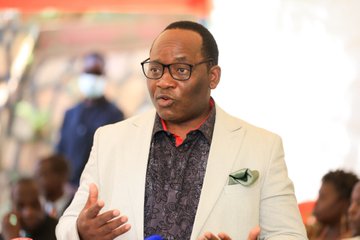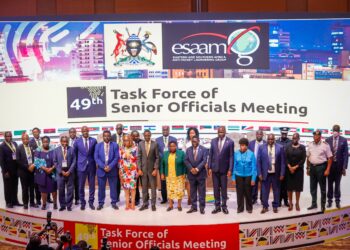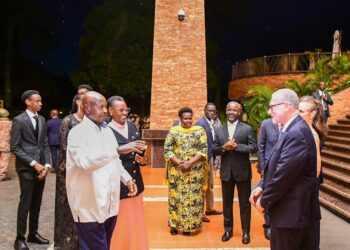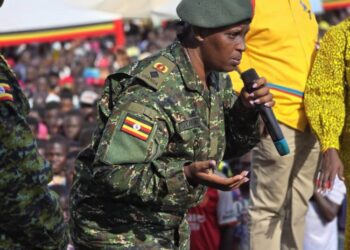The leader of the Democratic Alliance, Mathias Mpuuga, has called for a national referendum to decide whether Ugandans support President Yoweri Museveni’s stance on denying bail and bond to suspects.
This comes after President Museveni, in his New Year address, urged the judiciary to reconsider granting bail and directed the police to stop offering bond to suspects, arguing that those released on bond often reoffend, endangering national security.
In his statement, President Museveni expressed concern that individuals out on bail have been repeatedly arrested for similar or related crimes, a trend that he claims threatens public safety. His comments reflect ongoing frustrations with the judicial system’s handling of suspects and a desire to curb rising crime rates.
However, Mpuuga, a vocal critic of the President’s policies, has strongly opposed this move. Speaking to the media on Friday at his party’s offices in Mengo, Mpuuga warned that such actions are part of a broader pattern of interference with the judiciary and could exacerbate political tensions as Uganda approaches its 2026 elections. He argued that the President’s statements were not only undemocratic but also an affront to the independence of the judiciary.
Mpuuga emphasized that the country lacks sufficient legal personnel, including prosecutors, judges, and attorneys, to effectively manage justice. He noted that the President’s proposals might undermine an already strained judicial system, which is ill-equipped to handle a growing backlog of cases.
“We must ask Ugandans if they support such drastic measures,” Mpuuga said. “This issue should not be decided by a few individuals in power; it is a question that affects every citizen, and a referendum is the democratic way forward.”
The Democratic Alliance leader is also concerned that such moves will escalate political violence ahead of next year’s elections. With growing political tensions, Mpuuga warned that undermining judicial independence could lead to increased unrest and unrest in an already volatile electoral environment.
Mpuuga is pushing for electoral and political reforms that he believes will ensure a fairer and more transparent electoral process.
These reforms include measures aimed at reducing election-related violence, restoring public trust in the electoral system, and ensuring that elections truly offer the possibility of leadership change. According to Mpuuga, such reforms would be critical in preventing future election-related bloodshed and in fostering a peaceful transfer of power, a process that has remained elusive since Uganda gained independence.
The Democratic Alliance is working with other political organizations and civil society groups to push for these reforms, though Mpuuga noted that some have yet to respond, possibly due to the holiday season.
“We want to ensure these reforms are in place well ahead of the 2026 elections,” Mpuuga stated.
“If the opposition is to engage meaningfully, we need electoral reforms that ensure the integrity of the process and a level playing field for all parties.”
As part of his broader vision for Uganda’s future, Mpuuga has proposed a truth and reconciliation process to heal the deep divisions within the country. He called for an open dialogue to address the trauma caused by both state and non-state actors, acknowledging the wounds many Ugandans continue to carry.
“Our country has been deeply polarized,” Mpuuga said. “There are many whose lives have been ruined by violence, injustice, and oppression. A truth and reconciliation process is the only way forward to ensure lasting peace.”
Another part of Mpuuga’s political platform focuses on electoral fairness, calling for the expansion of voting rights to marginalized groups, including Ugandans in the diaspora and those in prisons. He also voiced opposition to a plan that could see parliament’s size increase by 50 members, arguing that it would further entrench political patronage.
“We cannot afford to keep expanding an already bloated parliament while failing to address the real issues that affect Ugandans,” Mpuuga argued.
Amid these political discussions, Mpuuga has come under fire for his support of controversial singer Patrick Mulwana, known as Alien Skin, who has been linked to multiple violent incidents. Mulwana, who was endorsed by Mpuuga as part of his political team, has been cited in three separate violent incidents, two of which are under judicial review.
However, Mpuuga defended his association with Mulwana, arguing that the youth involved in such gangs are products of a regime that has failed to provide opportunities for their development.
As Uganda nears another election cycle, the political landscape continues to shift, with Mpuuga’s calls for judicial reform, electoral change, and youth empowerment setting the stage for a turbulent year ahead.
Do you have a story in your community or an opinion to share with us: Email us at editorial@watchdoguganda.com













